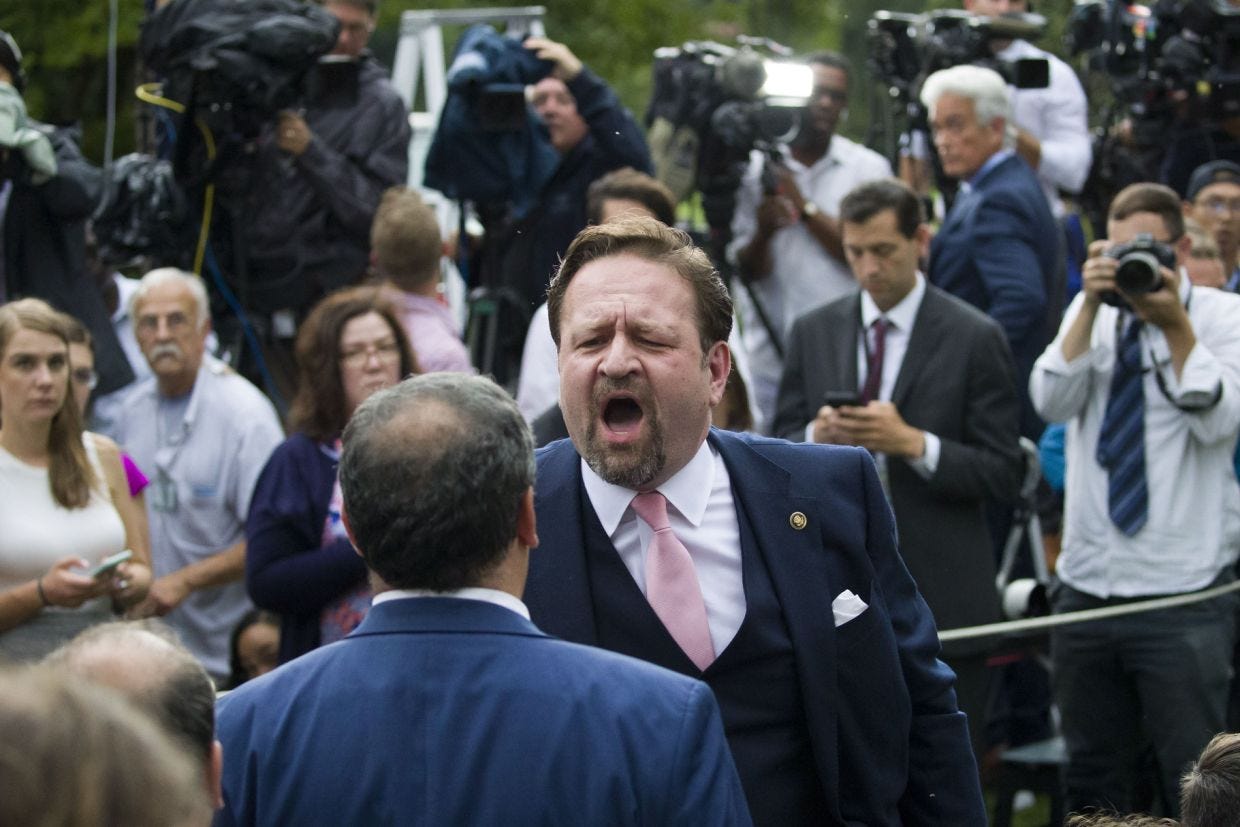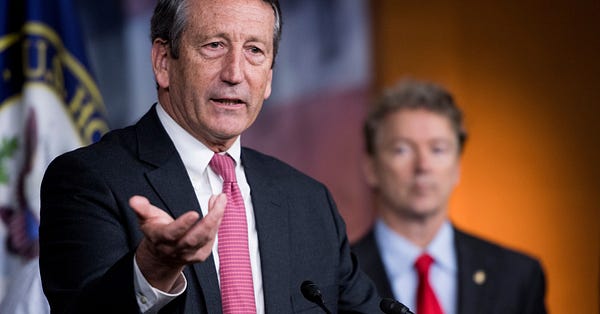
Editor’s note
Today’s edition goes out to everyone.
If you missed an issue, please subscribe!
(Just click the red button.)
Many thanks. —JS
The president hosted last week a skulk of sycophants who do nothing but adore The Dear Leader on social media and malign his enemies, especially legitimate reporters.
These are the most omega of beta males (nearly all are men), so the temptation among Washington’s news caste is to ridicule them but little else. Sebastian Gorka is indeed a puling blowhard. Seriously, it’s really hard to take that whiskered toad seriously!
We should, though, especially the Washington press corps.
Gorka and his garrulous goons are always getting left-swiped—they literally have a Georgie Porgie view of boy-girl relations—but give them a chance to murder consequence-free, and they’d surely take it. They might even suffer the consequences gladly, knowing the president would tacitly approve, if the victim were a reporter.
It doesn’t have to be this way. Journalists can but don’t act morally.
I say all this because I value the legitimate press. We need it. A democracy like ours depends on it. But the press often does not take seriously enough its solemn role in a republic and in a people’s collective commitment to self-rule. The moral corruption is so deep that one has to wonder what would happen if a reporter were killed.
All things being equal, I’d guess not much.
The press corps would continue giving this president an endless supply of benefit-of-the-doubt while offering impartiality even as he hopes for more homicide. The press would not likely rethink its role in creating the beast devouring it. It would not because the press has stopped acting morally. It’s amoral, in fact, and it’s anti-moral.
This week offered an example of a pattern we’ve seen since Donald Trump announced he was running for president. (The details don’t really matter, but you have probably heard about them by now.) The president attacked four House Democratic women of color. He said something horribly racist about them. They stood strong, rightly saying his comments were horribly racist. He denied they were horribly racist by issuing an equally horribly racist statement. They called him out again. Then he repeated himself.
The press has been covering this as tit for tat. One side hits. The other hits back. On it goes, leaving citizens to wonder what’s what. Or worse: leaving us to wonder if all they want to do in Washington is fight and not get anything done. The news has been lots of heat but no light. Result: journalistic malpractice and a bewildered citizenry.
It doesn’t have to be this way. Journalists can but don’t act morally. I do not mean moralizing. I mean assessing information methodically and coming to a reasonable conclusion about its meaning—then relaying that information, and meaning, so we all of us are better informed citizens. In other words, acting like grown-up journalists.
Trump really did write a racist tweet. This is not an interpretation. This is fact. Telling the other to “go back to the country they came from” even though they are US citizens is in keeping with our nation’s long and sad history of excluding classes of people from the American franchise. Worse, it can be, and it has been, a rationale for murder.
To call Trump out on his racism, and to place his racism in context, is not the moral equivalent of his racism or that racist history. But when you report that one side hits and the other side hits back without assessing the meaning of what’s been said and why, you are, (I hope) without meaning to, making them morally equivalent.
That’s inaccurate. That’s anti-democratic. That’s amoral.
But the press is also anti-moral.
On the one hand, it’s lazy to equate two morally unequal things. On the other, it’s anti-moral, because it’s refusing to make a judgment even when faced with overwhelming evidence pointing to an overwhelming conclusion. Trump has been making horribly racist statements for decades. His racism has informed his governance as president, such as the “zero-tolerance” policy that leads to and justifies the confiscation on children from lawful asylum seekers. And yet some in the press claim to be shocked—shocked, I tell you! CNN’s whiz-kid Chris Cillizza actually said the following:
Every day I am struck by how radically the GOP has changed from 2015 to today. The party is essentially unrecognizable from what it was when the 2016 GOP primary began.
That’s a firing offense if you ask me.
—John Stoehr
They are telling us who they are
If you liked Trump’s tweets, that means something.
Here’s what CBS News found this morning:
"I know some people don't like his tweets and they think he's crass. I -- that's why I voted for him," said retired businesswoman Mary Lou Kohlhofer.
Another supporter, Doug Thomas, said, "It's unfortunate he had to do it the way he had to do it… It's really the only way he can to get this country back."
Nancy Schneider even went so far as to echo the sentiment in President Trump's tweets, saying, "If you think you have it better in your -- where you came from or how they did things there, go back where you came from."





Part of the problem is that the senior executives at the major media organizations see the tit for tat dynamic as a way to generate high ratings and thereby increase revenues. People like Leslie Mooves when he was head of CBS and Jeffrey Zucker have the mindset that showing lots of conflict posing as debate between liberal pundits vs. nihilist reactionaries is like a sporting contest where both sides are morally equal. Their anti-moral stances allows them to pretend they are politically neutral while raking in large revenues. I would be very interested to see how someone like Zucker would react if someone assassinated one of the prominent CNN journalists or was beat up by a fired up mob at a Trump rally.